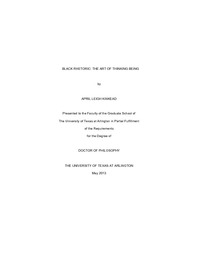| dc.description.abstract | This dissertation examines the Black Hermeneutic Situation in order to uncover Black Rhetoric's possibilities for thinking Being. Martin Heidegger's phenomenological hermeneutics and his theories on thinking and Being provide the theoretical framework through which this dissertation unconceals Black Rhetoric's historical and philosophical origins in Ancient Egypt (i.e., Kemet). In order to examinine the Black Hermeneutic Situation and its saying through Black Rhetoric, this examination establishes the benefits of Heidegger's phenomenological hermeneutics to an analysis of Black Rhetoric's lineage from Kemet to the United States via the Egyptian Diaspora and the Atlantic Slave Trade. Investigating the historical and philosophical origins of Black Rhetoric offers insight into the various modes of Black Rhetoric that evolved in order to confront and resist the dehumanizaing effects of white supremacy (i.e., a socio-political effort as well as a more insidious undercurrent of American culture). These modes of confrontation and resistance seek to protect, maintain, and promote human dignity through rhetorical modes of saying. Historical investigations into as well as rhetorical analyses of Slave Narratives, Black Abolitionist speeches, Black Sermons, and Civil Rights and Black Power Movement speeches reveal the evolutionary process of Black Rhetoric and unconceal the Black Hermeneutic Situation. This dissertation centers its broad historical narrative on close examinations of two of President Barack Obama's speeches (A More Perfect Union and Second Inaugural Address), which provide contemporary evidence for the evolution of Black Rhetoric from Western and Kemetic rhetorical traditions to its present state as a rhetorical mode of thinking Being that resists dehumanization by reclaiming human dignity. | |

